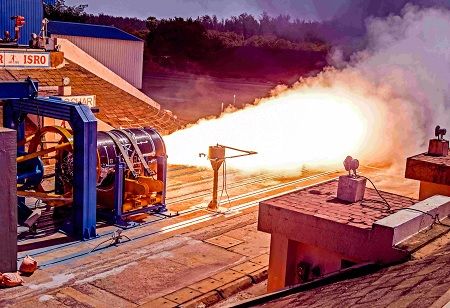
Skyroot Aerospace tests Kalam-250 for Vikram-1 Rocket's 2nd Stage

 Skyroot Aerospace, headquartered in Hyderabad and renowned for its contributions to Indian space technology, has achieved a significant milestone with the successful test-firing of the Stage-2 engine of its Vikram-1 space launch vehicle, also referred to as Kalam-250. This test, conducted at the propulsion testbed located within the Satish Dhawan Space Centre (SDSC) in Sriharikota, Andhra Pradesh, under the auspices of the Indian Space Research Organisation (ISRO), represents a notable advancement in India's private space sector.
Skyroot Aerospace, headquartered in Hyderabad and renowned for its contributions to Indian space technology, has achieved a significant milestone with the successful test-firing of the Stage-2 engine of its Vikram-1 space launch vehicle, also referred to as Kalam-250. This test, conducted at the propulsion testbed located within the Satish Dhawan Space Centre (SDSC) in Sriharikota, Andhra Pradesh, under the auspices of the Indian Space Research Organisation (ISRO), represents a notable advancement in India's private space sector.
Established in 2018 by Pawan Kumar Chandana and Naga Bharath Daka, Skyroot Aerospace has quickly risen as a leading force in transforming space exploration within India. Driven by a goal to democratize space access, Skyroot is committed to pushing technological limits, thereby enhancing the accessibility and affordability of space exploration.
Skyroot's progress has been driven by substantial investments and strategic partnerships. As per data from Tracxn, the company has garnered a total of $99.8 million across seven funding rounds, with key investors such as Temasek from Singapore and India's GIC. Notable achievements include securing $27.5 million in a recent funding round spearheaded by Temasek, indicating an increasing enthusiasm for India's private space industry.
The successful test-fire of the Kalam-250 Stage-2 engine adds to Skyroot's list of milestones. Earlier ones include the test-firing of the Kalam-100, the third stage of the Vikram-1 rocket, and the launch of India's first private rocket, the Vikram-S, in November 2022. The test, conducted on March 27, 2024, lasted 85 seconds and recorded a peak sea-level thrust of 186 kilonewtons (kN). The Kalam-250 engine, constructed from high-strength carbon composite materials, utilizes solid fuel and features an advanced Ethylene-Propylene-Diene terpolymers (EPDM) thermal protection system.
Equipped with a carbon ablative flex nozzle and high-precision electro-mechanical actuators for thrust vector control, the Stage-2 engine ensures precise trajectory adjustments during flight. Notably, the Vikram Sarabhai Space Centre (VSSC) contributed its proprietary head-mounted safe arm (HMSA) device for the test, highlighting collaborative efforts within India's space ecosystem. The successful test-firing of the Stage-2 engine clears the path for the upcoming orbital launch of the Vikram-1 rocket. Skyroot is optimistic about conducting the inaugural launch by the third quarter of 2024, pending further testing and preparations.